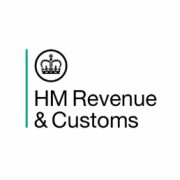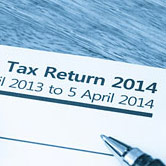AMAZING OFFER! Save Time, Money & Space with a FREE Sage Bookkeeping & Accounts Package!*
 [UPDATE: Please note that this offer has now expired]. Taxfile’s customers can benefit from an incredible offer on a range of Sage accounting packages at the moment. We’re offering a FREE or, in effect, heavily subsidised* Sage accounting package to all active Taxfile customers, whether existing or new. There are various different packages available so we’re sure we’ll have one which will suit every customer perfectly. The list of benefits is almost endless — here are just a few:
[UPDATE: Please note that this offer has now expired]. Taxfile’s customers can benefit from an incredible offer on a range of Sage accounting packages at the moment. We’re offering a FREE or, in effect, heavily subsidised* Sage accounting package to all active Taxfile customers, whether existing or new. There are various different packages available so we’re sure we’ll have one which will suit every customer perfectly. The list of benefits is almost endless — here are just a few:
- Firstly we’ll GIVE* Taxfile customers the package — you don’t have to pay Sage at all;
- Say hello to quick and easy bookkeeping and record-keeping;
- Quick and easy cash flow management tools;
- Cloud-based record keeping means you can access accounts records from anywhere with an internet connection;
- Automatic bank statement integration makes bank reconciliation a breeze, helping when receipts go missing and even recognising – and accounting for – regular transactions;
- A mobile app module allows you to simply snap a photo of your receipt and it uploads to your Sage account (say goodbye to physical receipt storage!);
- Less paperwork!
- Automatic tax computations performed by the software;
- Report and analysis options;
- VAT handling;
- Automatic VAT return options (or let us handle it for you as you prefer);
- Shows you the taxes and National Insurance due so you can easily pay them on time;
- Fast and easier tax returns;
- Help from Taxfile at any point and from Sage’s own helpful videos;
- Helps you stay in line with UK laws, taxes and regulations;
- No experience needed;
- Perfect for the self-employed, start-ups and small businesses;
- Taxfile will even be happy to set you up;
- Integrated invoicing and quotation options available (even from your mobile phone!);
- A quick and easy payroll bolt-on is also available for limited companies, with payslips, RTI, Auto Enrolment integration etc.;
- Auto enrolment communications included if you have a company pension scheme;
- Option to automatically integrate online e-commerce records into your Sage account;
- Fast and easier company accounts preparation;
- … and much more!
But there is more major benefit – collaboration with us, your accountant!
The Sage packages we supply are not only free, or in effect heavily subsidised depending on the package involved, but also allow us, your accountant and tax adviser, to collaborate with you within your Sage package with your permission. So where you cannot do something yourself, we can log in using our own integrated Sage administration system to get involved on your behalf, for example to set things up for you, run reports, activate VAT returns, tax returns, end of year accounts, payroll and so on. It’s amazing really! So you do as much or as little as you want to … and we cover everything else!
You save money!
Using the easy but powerful Sage bookkeeping and accounting packages supplied by Taxfile
means that you’ll save money. It’s as simple as that. Customers using such packages makes our job easier, reducing our chargeable hours working on your accounts, so quite simply saves you money!
You also save time!
Our Sage packages will save you SO much time you’ll never look back! Once you’ve tried our Sage packages for a while you’ll Read more


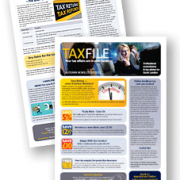
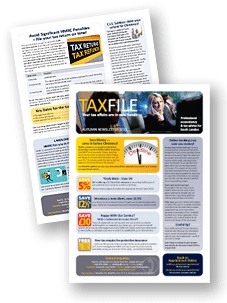

 TaxFile are offering a 5% reduction for clients who can submit their accounts to us before December 21st this year. This helps both of us — you receive a 5% reduction in your bill and it eases the rush in the New Year, our busiest time.
TaxFile are offering a 5% reduction for clients who can submit their accounts to us before December 21st this year. This helps both of us — you receive a 5% reduction in your bill and it eases the rush in the New Year, our busiest time.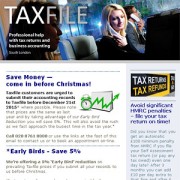

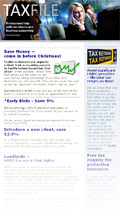

 A warning and reminder to landlords: the Chancellor’s Summer budget back in July will hit buy-to-let investors’ profits once the changes kick in, so now is the time to start planning ahead. Not all landlords will be affected though; if their rental property is mortgage free or if they sell within the next 2 years these changes won’t affect them. However those landlords that are Higher and Additional taxpayers will notice their tax relief reduce by 2020. Also, investors near the tax threshold could find themselves in the next tax bracket, which could have a knock-on effect and increase their tax exposure.
A warning and reminder to landlords: the Chancellor’s Summer budget back in July will hit buy-to-let investors’ profits once the changes kick in, so now is the time to start planning ahead. Not all landlords will be affected though; if their rental property is mortgage free or if they sell within the next 2 years these changes won’t affect them. However those landlords that are Higher and Additional taxpayers will notice their tax relief reduce by 2020. Also, investors near the tax threshold could find themselves in the next tax bracket, which could have a knock-on effect and increase their tax exposure.
 Hosts who rent out a spare room could soon see themselves being straddled with an unexpected tax bill if companies like ‘Airbnb’ are forced to share data with UK authorities.
Hosts who rent out a spare room could soon see themselves being straddled with an unexpected tax bill if companies like ‘Airbnb’ are forced to share data with UK authorities.